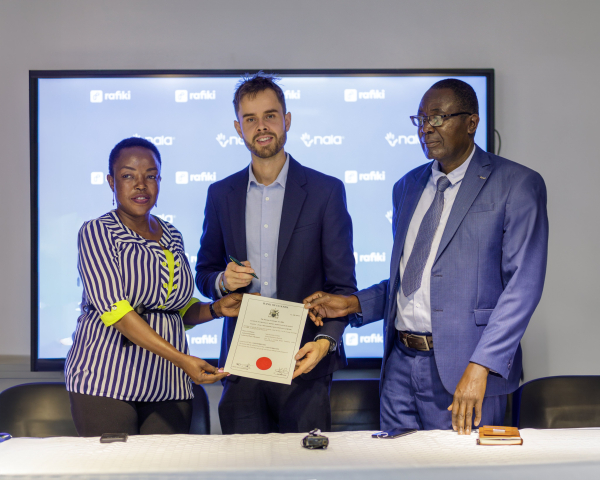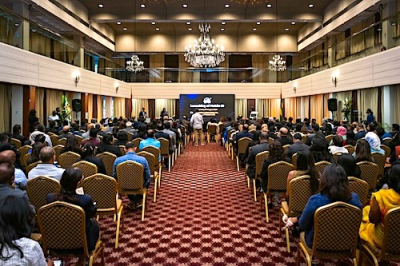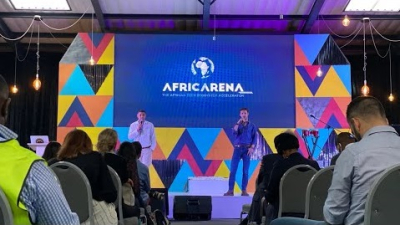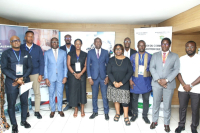The Bank of Uganda has granted Tanzanian fintech NALA an International Money Transfer Operator (IMTO) license, the fintech announced on August 29. This allows NALA to expand its operations in Uganda by integrating directly with mobile money services, offering users a seamless way to transfer funds into local mobile wallets and enhancing the efficiency and security of cross-border payments.
NALA facilitates money transfers from the UK, US, and EU to several African countries, including Uganda. It has collaborated closely with the Bank of Uganda to meet regulatory requirements, contributing to an increase in foreign exchange supply, which is vital for economic growth.
As an IT project manager and application developer, he has implemented various technological solutions across different sectors in Côte d'Ivoire. One of his most well-known products is a telemedicine application.
Anicet Amani (photo) is an Ivorian computer scientist and entrepreneur, and the founder and CEO of Skan Technologies, which specializes in software development and technological innovation.
Founded in 2011, Skan Technologies has developed several technological solutions across Africa. Its flagship product, SkanMed, is a telemedicine application that allows users to find a doctor and receive consultations remotely via video calls. After the consultation, the doctor can prescribe medication and/or recommend tests. SkanMed also enables users to order home healthcare services.
Another notable product from the startup is SkanTicket, an electronic ticketing application. This free solution allows users to create custom events, offer tickets or invitations online, promote their events, and manage access control on the day of the event.
Skan Technologies has also initiated other projects, such as SkanPhoto and SkanNpay. SkanPhoto is a photo sales application that, using facial recognition, allows anyone photographed at an event to automatically find their pictures. SkanNpay is a mobile payment app that facilitates payments via QR code.
Amani holds a master's degree in electronics, electrotechnics, automation, and computer science, obtained in 2009 from Félix Houphouët-Boigny University in Côte d'Ivoire. He began his career in 2010 at SA TIERI (Engineering, Studies, and Industrial Realizations) as an automation engineer, where he developed simulator systems. In 2012, he joined the software company VEONE Technologies as a Java project manager. From 2013 to 2019, he served as a solutions integration engineer at MTN in Côte d'Ivoire.
Melchior Koba
The Mauritian government has rolled out several ambitious programs to boost the country's digital transformation. Early results are promising, with modern infrastructure and digital public services becoming a reality.
Mauritius launched its Mobil ID, a digital identity card, on Thursday, marking a significant milestone in its digital transition.
The event, presided over by Technology Minister Deepak Balgobin, also showcased the Mobile Wallet Application (MWA), the tool through which the digital ID can be obtained.
Balgobin said the Mobil ID is more than a technological innovation; it represents a decisive government commitment to modernizing the nation. "Mauritius stands out as the first African country to adopt a digital identity card that meets international ISO standards. This technological advancement positions our country at the forefront, reinforcing our role as a leader in this new digital era," he stated.
The Mobil ID is the result of a collaboration between Thales and Harel Mallac Technologies. It is a key component of the "Digital Mauritius 2030" strategy, which aims to make digitalization one of the main pillars of the Mauritian economy. This ambitious strategy includes significant investments in digital infrastructure, digital skills training, and transforming public administration into a fully digital model. Supporting this initiative, Mauritius Telecom (MT) expanded its 5G network nationwide as early as June.
According to DataReportal figures published at the beginning of 2024, Mauritius had approximately 982,500 Internet users out of a population of 1.3 million, reflecting the population's growing embrace of the digital age.
The Mobil ID stands out for its advanced features, allowing citizens to report a change of address or declare the loss of their physical identity card. It also facilitates the electronic signing of official documents. To ensure user security, the Mobil ID incorporates two verification systems and dual authentication, providing effective protection against identity theft.
Samira Njoya
He has over 12 years of experience in software engineering, data science, artificial intelligence, and business development. With his latest venture, he aims to make cutting-edge AI technologies more accessible to businesses.
Idris Babatunde Olayemi (photo), a trained computer scientist and Nigerian entrepreneur, is the co-founder and CEO of InovaAI, a company specializing in artificial intelligence.
Founded in 2023, InovaAI provides AI-driven solutions to address complex challenges across the continent. The company offers an AI marketplace that allows businesses to access solutions via APIs (application programming interfaces) without requiring technical expertise. InovaAI also helps machine learning and AI engineers monetize their models.
InovaAI's mission is to make AI technology accessible to everyone in Africa. Among its flagship products is BetaBird, a solution designed to optimize the health and productivity of poultry. Through this application, farmers can detect poultry diseases early, assess egg quality, and significantly enhance their farming experience.
In addition to his role at InovaAI, Olayemi is the founder and CEO of Babtech Computers, a tech company established in 2020. Babtech Computers offers IT education services, software development, and training programs aimed at international-level businesses.
Olayemi also serves as the technical lead at Connetmi Live Market, an online commerce platform that allows sellers to interact directly with their customers and prospects.
Before venturing into entrepreneurship, Olayemi worked as a software developer in several Nigerian companies from 2013 to 2018. He later joined Diamond Bank as a data specialist. In 2019, he was appointed as a data scientist at The Emel Group, a wholesale trading company.
Melchior Koba
Amazon has been expanding its presence in Africa for years. As the company celebrates its 20th anniversary on the continent, it is setting ambitious goals to achieve by 2029.
Amazon.com Inc's cloud computing unit, Amazon Web Services (AWS), plans to invest an additional $1.7 billion in Africa by 2029 to expand its cloud and artificial intelligence services, the company said on Thursday. The investment was announced at the AWS Summit 2024 in Johannesburg.
"The AWS community in Sub-Saharan Africa is thriving," said Chris Erasmus, AWS Managing Director for South Africa. "We have thousands of AWS customers in Sub-Saharan Africa today, and we see this as an incredibly strategic growth area for us. [...] We have over 6,000 partners helping us build and deliver our business value."
The investment is part of Amazon's celebration of its 20th anniversary in Africa. In 2020, the company followed Google by launching data centers on the continent. In October 2024, it launched its online retail service in South Africa, the second African country where it has introduced this service, following Egypt.
Amazon's investment will also focus on generative AI, highlighting Amazon Bedrock, its platform that enables businesses to create and develop generative AI applications.
Adoni Conrad Quenum
Nairobi, Africa’s Silicon Savannah, will host the AfricArena Nairobi Summit during Africa Climate Tech Week from September 3-4, 2024.
We’re heading to Kenya! 🇰🇪 Excited to announce the AfricArena Nairobi Summit from Sept 1-4, focusing on Climate Tech in Africa! 🌍
— AfricArena (@AFRICARENA) July 15, 2024
This summit will bring together investors, startups, and policymakers to advance Climate Tech in Africa.
🔗https://t.co/rGN8PJAEki🌱#ClimateTech pic.twitter.com/3MJeD6RMAc
The event will highlight over 20 top climate tech and green economy startups, showcasing innovations and reinforcing Nairobi’s role as a key driver in Africa’s tech and investment scene.
The summit will feature startups like Aquarech, RHEA Soil Health, and iShamba Limited, along with 6 Korean startups expanding into Africa.
Omnisient, a South African startup focused on privacy-preserving data collaboration, has raised $7.5 million in Series A funding from Arise, an investor in African financial service providers and fintechs. The startup announced the funding on August 27.
The investment will fuel Omnisient’s expansion into markets in Africa, the UK, the US and the Middle East. It will also allow Omnisient to partner with larger data providers, expanding financial services access globally.
Flutterwave has secured a Payment Systems Operator (PSO) license from the Bank of Uganda, enabling it to offer its payment solutions to businesses in the east-african country. The company announced this new move on August 28.
Ki kati Uganda, we have brought the wave to you! 🇺🇬🦋
— Flutterwave (@theflutterwave) August 28, 2024
We have secured a Payment Systems Operator license from the Bank of Uganda!
Expanding into Uganda aligns with our vision of a financially connected Africa where enterprises can operate seamlessly on the continent and expand… pic.twitter.com/4WKblu1GkA
This milestone allows Ugandan businesses to accept various payment methods, including mobile money, bank transfers and cards, while also facilitating easy remittances from the diaspora.
The expansion allows businesses to boost growth and efficiency by capitalizing on Flutterwave’s solutions, including payment collection, seamless payouts and invoicing.
He's dedicated to helping children with Attention Deficit Hyperactivity Disorder (ADHD) thrive. He provides virtual reality tools to assist therapists in their work.
Ahmad Al-Kabbany is an Egyptian computer scientist and entrepreneur, and the founder and CEO of VRapeutic, a startup specializing in the development of therapeutic and rehabilitation solutions through innovative software.
Founded in 2017, VRapeutic harnesses the power of virtual reality (VR) to create therapeutic experiences. The company integrates biofeedback and artificial intelligence into its solutions, aiming to enhance the quality of therapy sessions for children with autism and Attention Deficit Hyperactivity Disorder (ADHD).
VRapeutic allows therapists to deliver personalized content through supervised sessions while monitoring the impact of the therapy program through both short- and long-term progress of the children. The content developed by the startup is based on scientific data and is provided under the supervision of experienced doctors and therapists.
The startup is a former participant in the Flat6Labs Cairo accelerator and the Invest Ottawa pre-acceleration program. Since 2020, it has been part of UNICEF's Innovation Fund portfolio.
In addition to leading VRapeutic, Ahmad Al-Kabbany is a founding member of the Intelligent Systems Lab, established in 2018. This lab focuses on research in intelligent and autonomous systems, image and video processing, computer vision, image synthesis, immersive technologies, signal analysis, and data science.
He is also a founding member of the Multimedia Interaction and Communication Lab, launched in 2024. This lab explores new ways to encode signals and improve human-computer and media interactions.
Ahmad Al-Kabbany holds a master's degree in Electrical, Electronics, and Communications Engineering, obtained in 2008 from the Arab Academy for Science, Technology and Maritime Transport in Egypt. He also earned a Ph.D. in Electrical and Computer Engineering in 2016 from the University of Ottawa, Canada.
Melchior Koba
E-commerce in Côte d'Ivoire has seen a surge in recent years, with a marked increase in online retail sites and sales volume.
Key players in Côte d'Ivoire's e-commerce sector gathered in Abidjan on Wednesday and Thursday to discuss the future of the industry. The market, valued at over XOF280 billion (€421.6 million) in 2023, is expected to see a compound annual growth rate of 11.3% through 2027, according to figures presented at the strategic workshop.
The workshop, initiated by the Ministry of Commerce and Industry in collaboration with the consulting firm Marabu, focused on promoting a national strategic vision for e-commerce development. The goal is to cultivate a competitive, inclusive, and sustainable digital ecosystem.
"We aim to position Côte d'Ivoire as a regional hub in this rapidly expanding sector. We are here to collaborate, exchange ideas, and develop initiatives that will foster a competitive, inclusive, and sustainable digital ecosystem," stated Sylla Kalilou, Director General of External Trade, who represented Minister of Commerce and Industry Souleymane Diarrassouba.
Like many African nations, consumers in Côte d'Ivoire are increasingly attracted to online shopping, driven by both local and international e-commerce platforms like Jumia, Afrimarket, and Africashop, which provide a diverse array of products and services. However, despite this rapid growth, the Ivorian e-commerce market remains largely underdeveloped, with many startups facing challenges in establishing themselves.
Through this initiative, the government aims to facilitate dialogue among stakeholders in the sector to enhance e-commerce in Côte d'Ivoire. The initiative also seeks to communicate ongoing reforms, which include drafting and validating a new e-commerce law, implementing a national e-commerce strategy, creating a strategic action plan through 2028, and developing regulations for a public-private consultation framework.
Samira Njoya
More...
A technology enthusiast with extensive experience in embedded systems and robotics, he has developed an open-source platform dedicated to building robots.
Kayoum Djedidi, a Tunisian electronics engineer and entrepreneur, is the co-founder and CEO of Open Organic Robotics (OORB), a startup that aims to make it easier for people to create robots.
Founded in 2023, OORB provides a suite of tools to help users build robots from start to finish, including the OORB platform, the OORB Robodog educational kit, and a dedicated community.
The OORB platform is an open-source robotics development framework that features an intuitive graphical interface, supports multilingual programming, and includes a CAD tool for editing modular parts. With AI and a chatbot, users can generate code, components, and services.
The OORB Robodog educational kit is an open-source, 3D-printed robot designed to introduce users to the OORB platform. The OORB community brings together enthusiasts around open-source principles and offers 3D printing services and paid robotics projects.
In addition to his role at OORB, Djedidi is an Edge MLOps engineer at Ubotica Technologies and a research intern at the National Engineering School of Sousse. He holds a bachelor's degree in embedded systems from the Higher School of Science and Technology of Hammam Sousse.
Djedidi's professional career began in 2018 at Tekaya Travel Holiday, a Tunisian travel agency. He has also worked at Kaza Trade, a wholesale company, and ARSELA Technologies, a no-code automation service provider. From March 2022 to March 2024, he worked as an embedded systems and Python instructor at GOMYCODE, a startup focused on digital skills training.
Melchior Koba
To advance information and communication technologies, the International Telecommunication Union is forming strategic partnerships
The University of the Witwatersrand (Wits) announced on Monday a partnership with the International Telecommunication Union (ITU) to accelerate digital skills development among policymakers and ICT professionals across Africa.
As part of the collaboration, Wits’ LINK Centre will join the ITU Academy’s network of training centers.
“This significant milestone will complement the postgraduate degree programs and the professional certificates offered by the LINK Centre. The Centre is poised to contribute substantially to the critical skills required for the economic and social advancement of South Africa and beyond, promoting a globally connected and digitally proficient society,” Wits said in a statement.
The ITU established its academy in 2012 to meet the growing demand for training, education, and research in the ICT sector. Over the years, various entities have joined the program, benefiting from the specialized knowledge and tools provided by the UN agency to navigate the rapidly evolving digital ecosystem.
Wits is one of the top universities in South Africa and the continent. According to the 2023 QS Ranking, it ranks as the second-best university in Africa, behind the University of Cape Town and Stellenbosch University.
Adoni Conrad Quenum
She wants to make learning more engaging for students by teaching them in their native languages from kindergarten to high school. To do this, she created a technology platform that helps students learn in their mother tongue.
Mukundi Lambani (photo) is a South African entrepreneur and the founder and CEO of Ambani Africa, an educational technology company dedicated to promoting mother-tongue education for children from kindergarten through high school.
Founded in 2021, Ambani Africa provides a platform that facilitates early learning by offering digital resources that enable students to learn in African languages. The platform’s goal is to empower students to learn and communicate effectively in their native languages.
Ambani Africa’s learning experience is interactive, featuring games, videos, e-books, and lessons. The content is available in English and over 15 other languages, including isiZulu, Kiswahili, Yoruba, French, Spanish, and more.
According to Mukundi Lambani, African languages are woefully underrepresented in the digital realm, leaving young learners struggling to find educational resources in their native tongue. She emphasizes the critical importance of the early years for language development, noting that falling behind by third grade can be a significant hurdle. That's why Ambani places such emphasis on mother-tongue education during this crucial stage.
Lambani holds a bachelor’s degree in film from the African Film and Drama Academy (AFDA), earned in 2008. She also obtained a diploma in business management and administration from Varsity College in 2011. In 2017, she completed a master’s degree in communication and media studies at Bournemouth University in the UK. In 2019, she earned a certificate in intellectual property management from the University of Witwatersrand.
Lambani’s career began in 2008 at the South African Broadcasting Corporation as a video editor. In 2010, she joined the 48 Hour Film Project as a producer. By 2013, she became head of research and development at Brainbow Conscious Creatives, a creative agency. In 2017, she was appointed as a lecturer at the Academy of Sound Engineering, and in 2018, she became a project manager at the Goethe-Institut, a German cultural institute.
Melchior Koba
Launched in June 2022 by Osita Oparaugo, the Nigerian edtech GetBundi provides access to educational content in science, technology, engineering, and mathematics (STEM) and digital skills.
On Thursday, August 29, the Nigerian edtech startup GetBundi announced the signing of a memorandum of understanding (MoU) with the National Commission for Colleges of Education (NCCE). The initiative, titled "Empowering Tomorrow’s Teachers," aims to equip both students and teachers with essential digital skills.
“This initiative is not just about filling gaps in numbers but also about enhancing the quality and attractiveness of the teaching profession by equipping our future teachers with 21st-century digital skills. In today’s rapidly evolving educational landscape, our teachers must be well-versed in digital tools and technologies that enhance learning outcomes,” said Paulinus Chijioke Okwelle, Executive Secretary of the NCCE.
The program comes at a time when digital transformation is accelerating across the continent. Nigerian authorities are increasingly launching initiatives to train the population in digital skills. In August 2023, the government partnered with American tech giant Google, which plans to invest $1.5 million to train 20,000 youths in digital literacy. Later, the American Business Council (ABC) and Microsoft also committed to similar efforts.
These initiatives align with the digital agenda of President Bola Tinubu’s administration, unveiled in May 2023. Nigeria is a leading tech hub in Africa, with one of the most attractive startup ecosystems on the continent. Nigerian startups secured $469 million in 2023, representing 20.39% of the total funding raised by African startups, according to Partech Africa.
However, the country still faces significant challenges in the sector. According to the International Telecommunication Union, Nigeria ranks 26th in Africa with an ICT development index of 46.9 out of 100 in 2024, trailing far behind the top three—Libya (88.1), Morocco (86.8), and Seychelles (84.7).
Adoni Conrad Quenum















